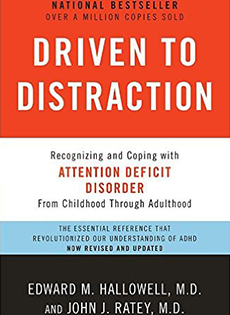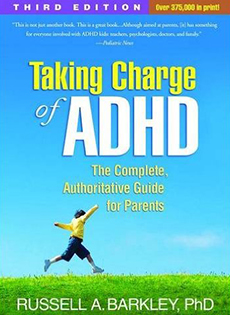What is ADHD?
Attention-deficit/hyperactivity disorder (ADHD) can affect a person’s ability to sit still, pay attention, and focus on details. While the severity and type of ADHD varies, individuals with ADHD are often fidgety, hyperactive, and impulsive. These symptoms can create issues at school and at home.1
- 1 in 10 School-age children are affected by ADHD2
- 3 out of 4 Children with ADHD will carry symptoms into adulthood2
- 3:1 ADHD diagnoses are 3 times more likely in boys than in girls1
Early Signs of ADHD
- Struggles to pay attention; easily distracted2
- Forgetful or loses things often2
- Trouble sitting still; constantly squirms or fidgets2
- Impatient; interrupts or talks over others2
- Struggles with quiet activities2
- Lacks attention to detail; often makes careless mistakes2
Three Types of ADHD
According to the Diagnostic and Statistical Manual of Mental Disorders (DSM), there are three types of ADHD:
- Predominantly Inattentive: Struggles to get focused or stay focused1
- Hyperactive-Impulsive: Very active and regularly acts without thinking1
- Combined: Inattentive, impulsive, and overly active1
What to Do if You Notice Signs of ADHD
Take Notes
If you notice one or a combination of the symptoms listed above, begin making notes on the worrying behaviors you see. The more information you have when talking to a specialist, the better.
Talk to Your Child’s Teacher
Are the same behaviors you notice at home interfering with your child’s academic performance? Ask your child’s teacher whether inattention and hyperactivity are distracting your child in the classroom.
Get an Evaluation
To be tested for ADHD, your child will need a comprehensive evaluation that includes clinical assessments of their academic, social, emotional, and developmental levels. Clinical psychologists, clinical social workers, nurse practitioners, neurologists, psychiatrists, and pediatricians can diagnose ADHD.2
Be Proactive and Trust Your Gut
People with ADHD can be smart and successful in school and in life — but without the right diagnosis and interventions, symptoms can cause problems in school and at home. As a parent, you know your child best and should make the decision about whether an evaluation is necessary.2
What to Do if Your Child is Diagnosed with ADHD
Find a Specialist
Look for a professional who specializes in ADHD and offers research-based methods specifically for ADHD.
Request Classroom Adaptations
Ask your child’s teacher about making simple classroom accommodations to improve your child’s focus. For example, ask the teacher to:
- Establish clear rules and daily routines for your child1
- Work one-on-one with your child on study skills and learning strategies1
- Provide regular breaks to allow your child to channel his or her physical energy1
Create an Individualized Education Plan
Work with your child’s teacher and school administrators to put together a formal, detailed Individualized Education Plan (IEP). The plan should be tailored to your child’s needs and will hold the school accountable for special accommodations. Request a written copy of this plan.1
Consider Medication
Talk to your doctor about whether or not medication is an appropriate treatment for your child’s ADHD.2 Medication can be part of an effective treatment plan, but should not be the entire plan.
Common ADHD Myths
Myth:All types of ADHD are the same.
Fact:There are three types of ADHD: predominantly inattentive, hyperactive-impulsive, and combined. ADHD can also be designated mild, moderate, or severe.1
Myth:Children will outgrow symptoms of ADHD.
Fact:Studies show that symptoms persist into adulthood for about three out of four individuals with ADHD.2
Myth:ADHD is not a real disorder, but a behavioral issue.
Fact:ADHD is listed in the Diagnostic and Statistical Manual of Mental Disorders (DSM). Symptoms are real and without intervention, individuals can encounter difficulties in school, at home, and into adulthood.
Myth:Girls do not have ADHD.
Fact:While boys are more likely than girls to be diagnosed with ADHD, girls are also at risk, and many go undiagnosed.2
Myth:Medication is the only treatment for ADHD.
Fact:While medication may be part of the intervention plan for some individuals with ADHD, it is also important to implement other strategies. There are three important components for ADHD intervention: an education plan, social behavioral tools such as fidgets, charts, or rewards, and finally, medication.
Additional Resources on ADHD
Shop through AmazonSmile and Amazon will donate 0.5% of your purchase to Churchill.


Driven to Distraction: Recognizing and Coping with Attention Deficit Disorder
Edward M. Hallowell, MD and John J. Ratey, MD
Taking Charge of ADHD: The Complete, Authoritative Guide for Parents
Russell A. Barkley, PhD
References
- Attention Deficit/Hyperactivity Disorder Fact Sheet. LD Online. Retrieved from http://www.ldonline.org/article/Attention_Deficit/Hyperactivity_Disorder_Fact_Sheet
- About ADHD. CHADD. Retrieved from http://www.chadd.org/Understanding-ADHD/About-ADHD.aspx